The increasing reliance on user-generated reviews for making purchasing decisions has brought the authenticity of reviews into sharp focus.
We’ve analyzed the presence of fake AI reviews in a number of industries, including health and wellness products, healthcare clinics, airlines, and even holiday shopping.
In addition, we’re also continuing to monitor the increasing presence of AI content in Google Search Results.
To further study the presence of AI across sectors, in this study, we specifically looked into reviews on Airbnb.
Platforms like Airbnb, where travelers rely heavily on customer feedback to choose accommodations, are not immune to the challenges posed by AI content.
With advancements in natural language processing (NLP) and AI-driven text generation tools such as GPT, it has become increasingly easy to create AI reviews that are indistinguishable from those written by humans — at least to the human eye.
This raises critical questions about trust, transparency, and the impact of AI-generated content on consumer behavior.
As AI tools become more sophisticated, it is crucial for platforms like Airbnb to implement robust detection mechanisms and educate users about the potential for manipulated content.
In this analysis, we explore the prevalence of AI-generated reviews on Airbnb to:
This study aims to contribute to the ongoing dialogue about the ethical use of AI and its impact on online ecosystems. Further, it hopes to offer insight into how stakeholders can navigate the challenges of maintaining authenticity in the digital age.
These findings indicate a sharp acceleration in the use of AI to generate Airbnb reviews.
More broadly, the findings of our analysis hold implications for the credibility of user-generated content across platforms.
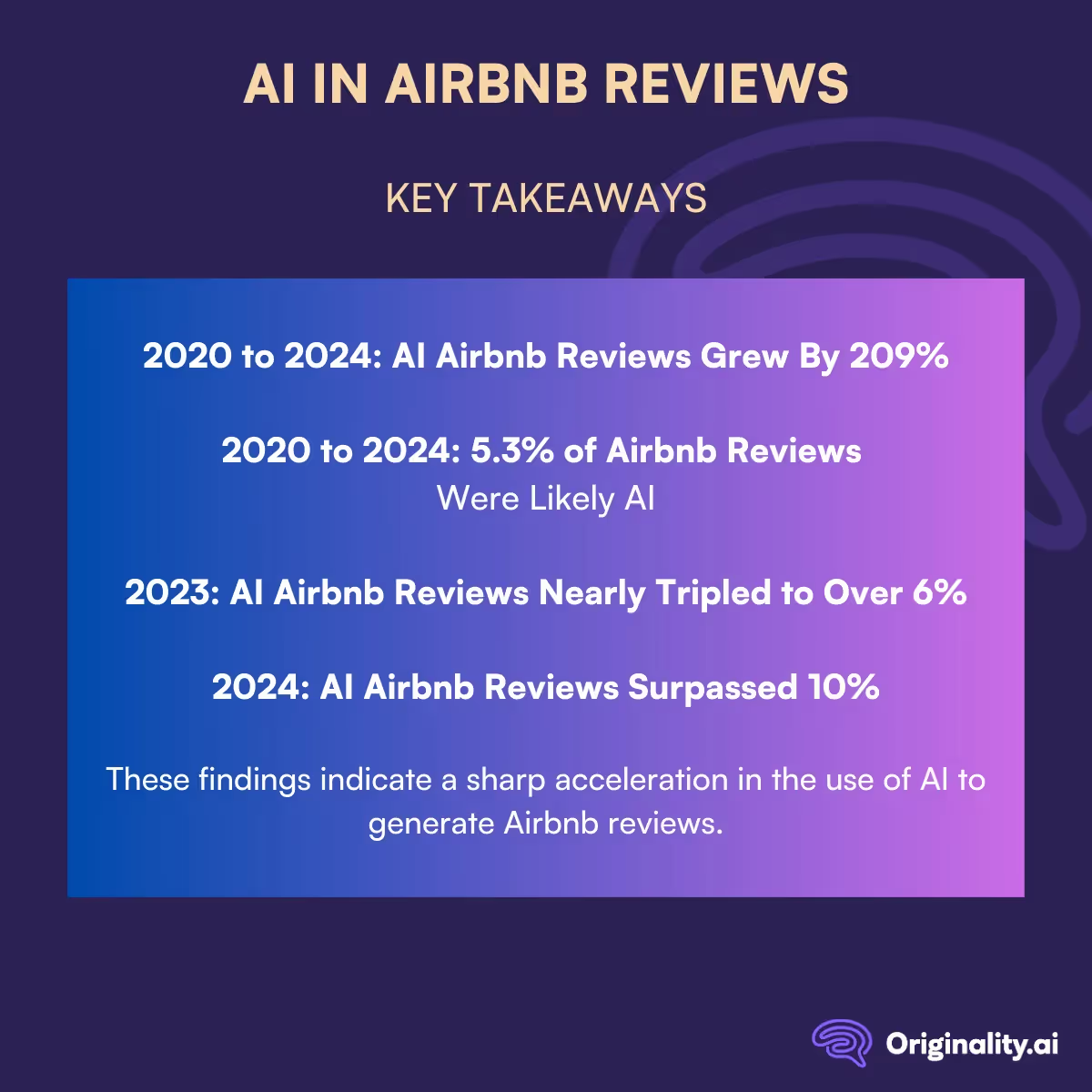
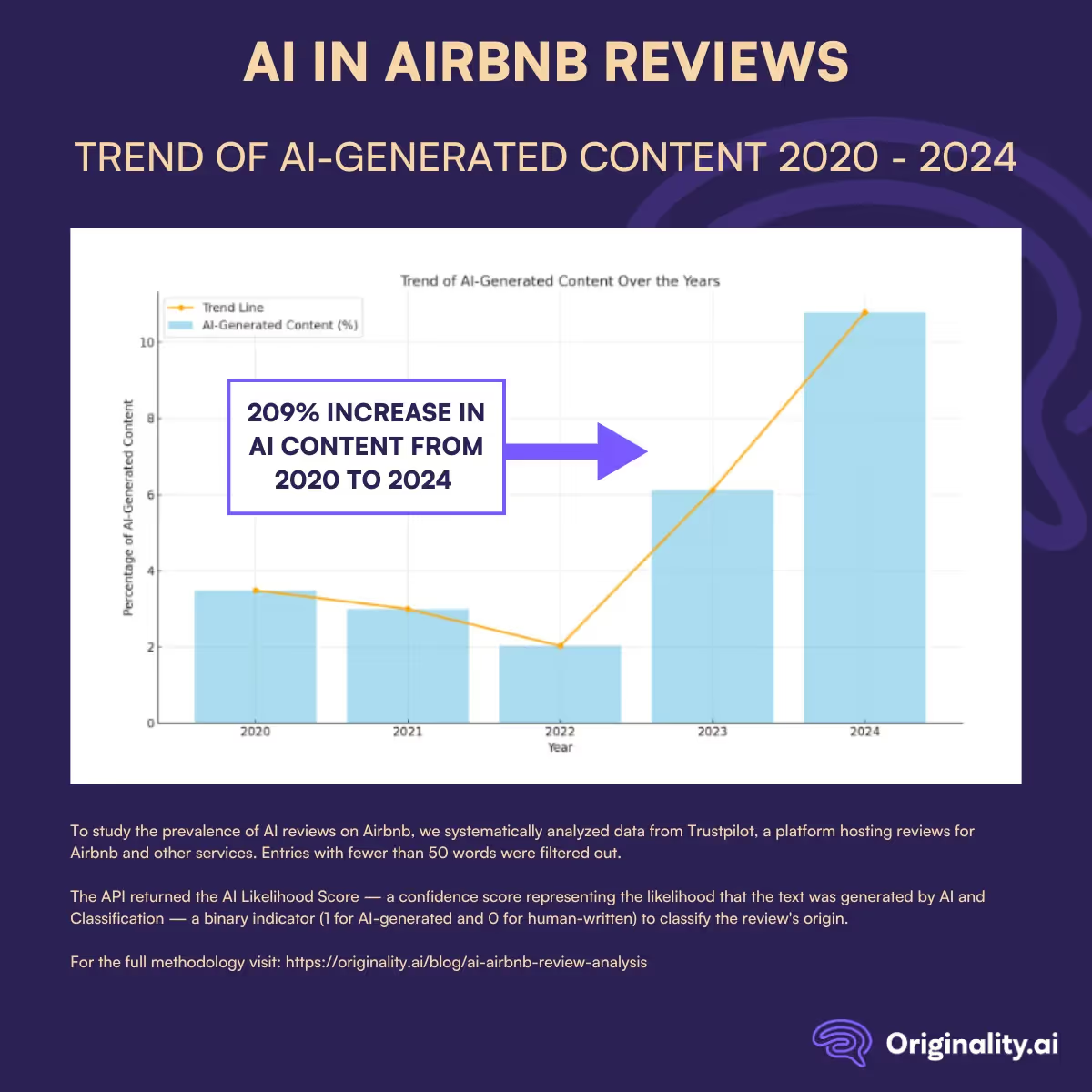
The above graph illustrates the percentage of AI content in Airbnb reviews from 2020 to 2024.
This visualization highlights a 209% increase in the use of AI to create Airbnb reviews.
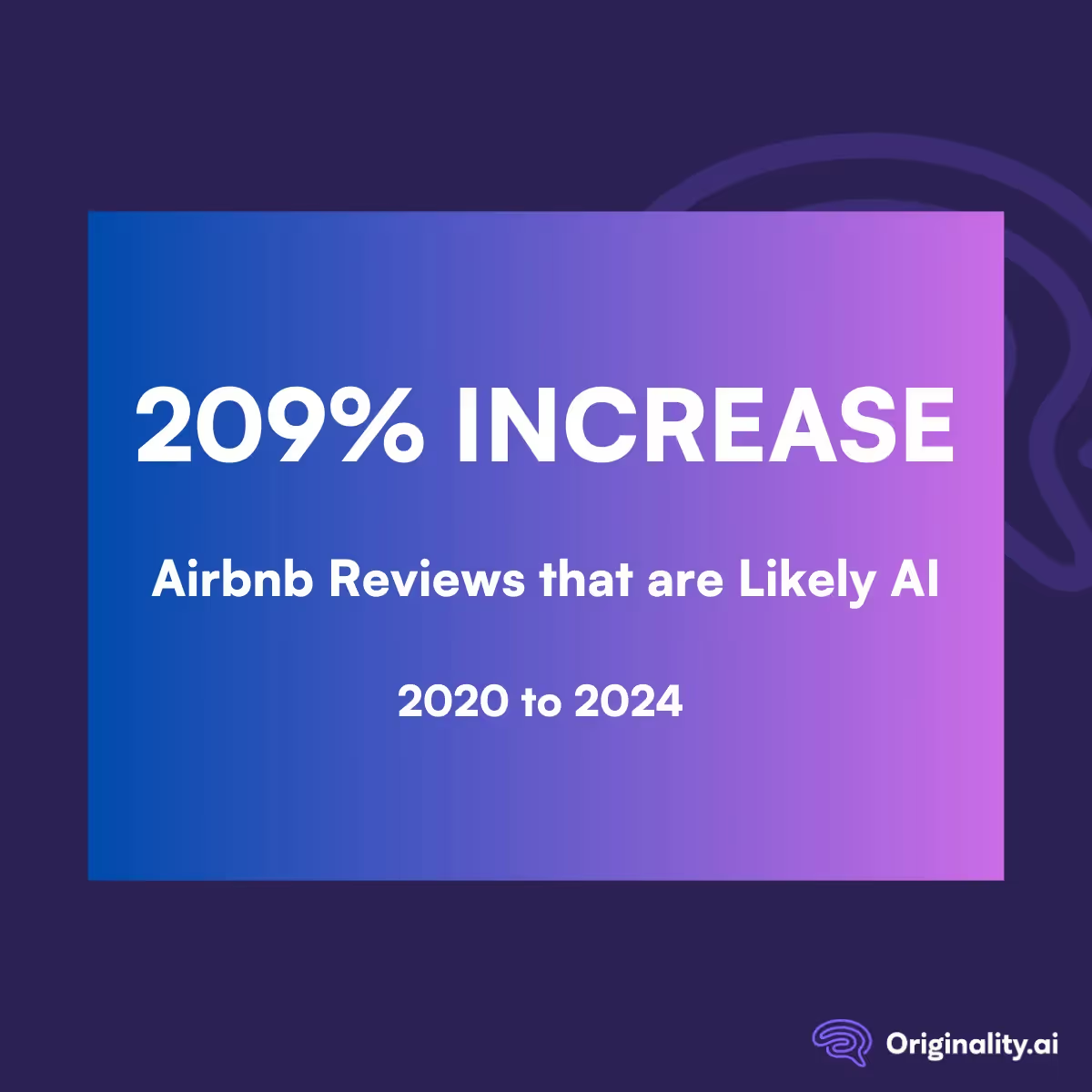
Further, there’s a dramatic uptick occurring after 2022 — corresponding to the launch of ChatGPT.
The rapidly rising upward trajectory (depicted by the orange trend line) underscores the issue’s urgency. If the current growth rate continues, AI reviews could soon represent a significant proportion of reviews, potentially distorting consumer perceptions and host reputations.
Overall, from 2020 to 2024 the average rate of AI Airbnb reviews was 5.3%. However, if we take a closer look at the trendline in segments from 2020 to 2022 and 2023 to 2024, we can see a sharp increase in AI reviews after the launch of ChatGPT in 2022.
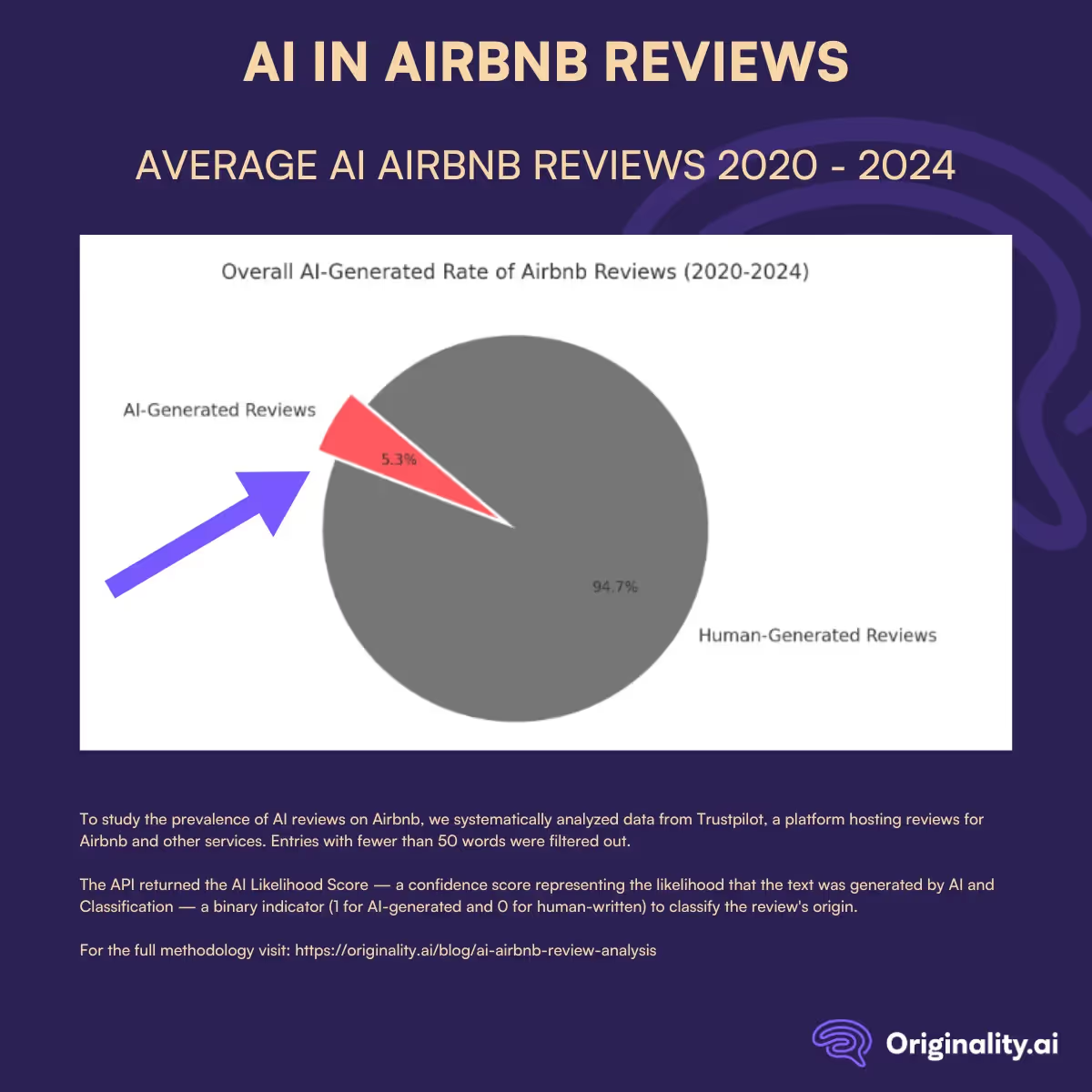
From 2020 to 2022, the percentage of AI-generated reviews remained relatively low and showed a slight decline.
The percentage of AI Airbnb reviews fell from a rate of 3.5% in 2022 to just 2% in 2022.
This trend might indicate that during this period, AI tools were either less accessible or less commonly adopted for creating reviews.
However, starting in 2023, a significant rise is observed. AI-generated content nearly tripled to over 6% in 2023.
The sharp rise in 2023, continuing into 2024 could be attributed to advancements in generative AI technologies, making it easier for individuals or businesses to create realistic, AI-generated reviews.
As of 2024, the percentage of AI reviews has surpassed 10%, indicating a sharp acceleration in the use of AI for generating reviews.
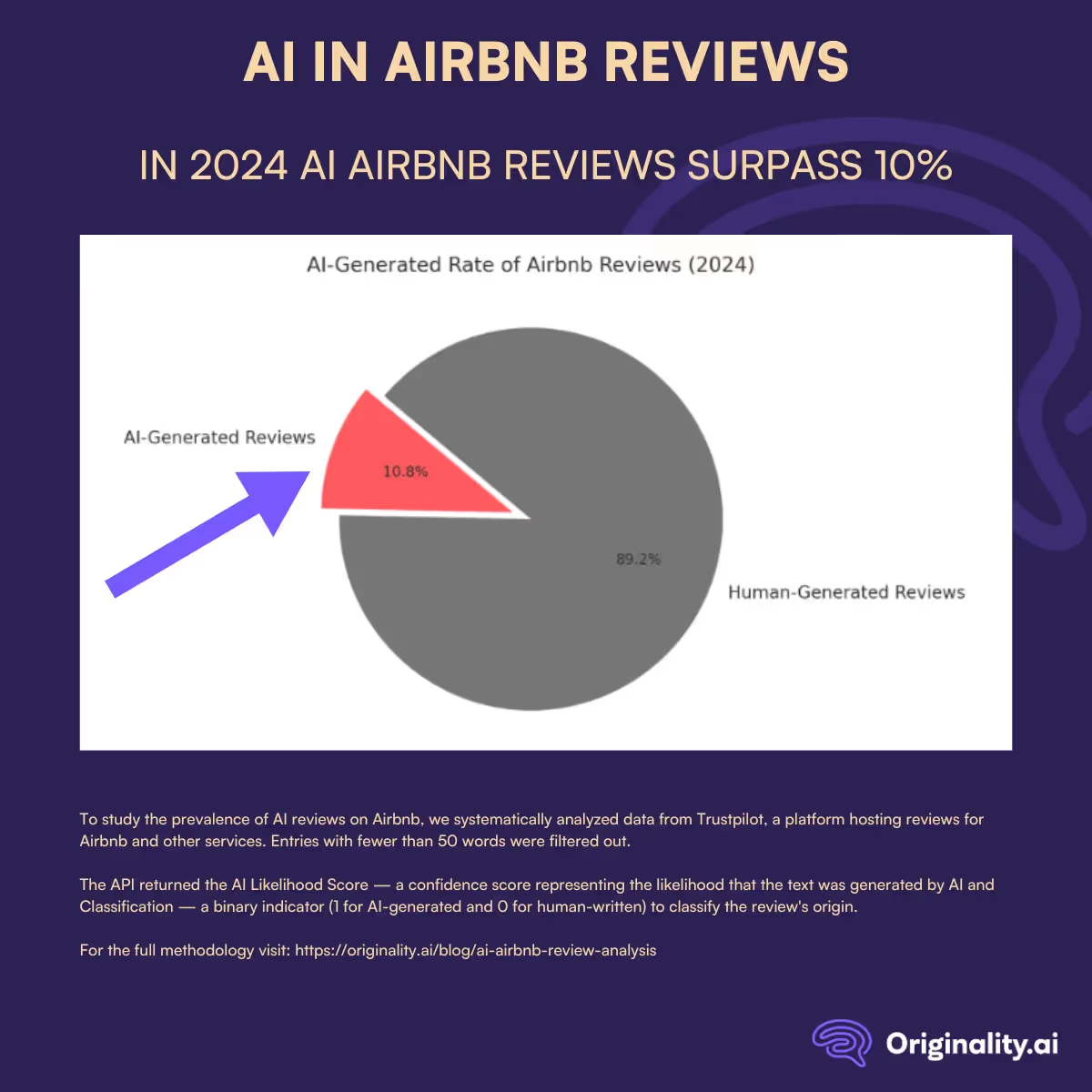
The rise of AI reviews in 2024 means that from 2020 to 2024 the percentage of AI Airbnb reviews has grown over 209%.
This surge highlights the evolving role of AI in digital communication and consumer feedback.
Such a trend raises important considerations for industries like travel and hospitality, where reviews play a critical role in shaping consumer perceptions.
It also underscores the need for systems to identify and manage AI-generated content to maintain trust and authenticity in online reviews.
As AI continues to integrate into various sectors, monitoring such trends is crucial to understand its impact on consumer behavior and market dynamics.
This trend raises important questions about the integrity and authenticity of online reviews, as the increasing prevalence of AI-generated content can undermine consumer trust.
Platforms like Airbnb, which rely heavily on reviews to guide consumer decisions, may need to implement robust mechanisms to detect and manage AI-generated content effectively.
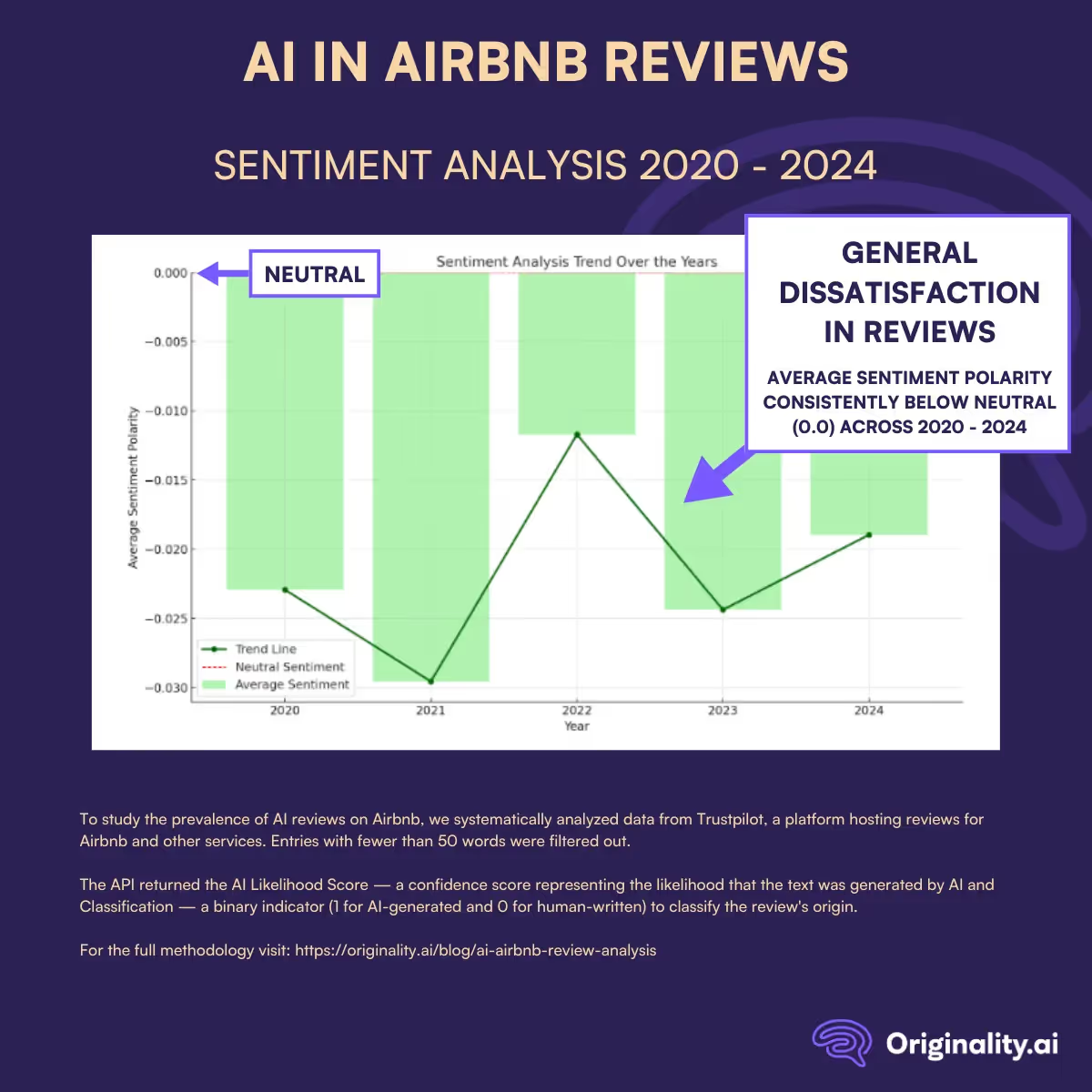
The sentiment analysis of Airbnb reviews over the years reveals an overall negative trend, with average sentiment polarity consistently below neutral (0.0) across all years.
While the average sentiment polarity varies slightly from year to year, the persistent negative values indicate a general dissatisfaction or critical tone in reviews.
This could reflect:
In 2020, the average sentiment polarity was -0.0229, suggesting a slightly negative sentiment.
This trend continued and slightly worsened in 2021, with an average sentiment of -0.0296.
The dip in sentiment during this period could be linked to disruptions caused by the COVID-19 pandemic, as travel restrictions and cancellations might have created frustrations among users.
Interestingly, in 2022, there was a slight improvement, with the sentiment reaching -0.0117, closer to neutral.
This could signify an adjustment phase as the travel industry began recovering, with more users returning to travel and possibly experiencing fewer issues.
However, by 2023, sentiment declined again to -0.0244, indicating renewed challenges or unmet expectations. In 2024, the sentiment showed a modest recovery to -0.0190, though it remained in negative territory.
Overall, while the sentiment polarity remains predominantly negative, the fluctuations suggest a complex interaction of factors influencing user sentiment.
External events like the pandemic and internal service quality likely play significant roles.
These insights underscore the need for continued improvement in service quality and customer experience to foster more positive user feedback.
Monitoring sentiment trends can also provide valuable feedback loops for businesses to address emerging issues proactively.
The average overall rate of AI Airbnb reviews from 2020 to 2024 at 5.3% is moderately higher than the average false positive rate in AI detection.
False positives occur when an AI detector identifies original human-written content as AI and can vary by company and AI detection model.
At Originality.ai our Lite Model has a false positive rate of under 1% and our Turbo model has a false positive rate of under 3%.
Learn more about AI detection accuracy and our AI detection models at Originality.ai.
At Originality.ai, we have monitored the presence of AI reviews across several industries.
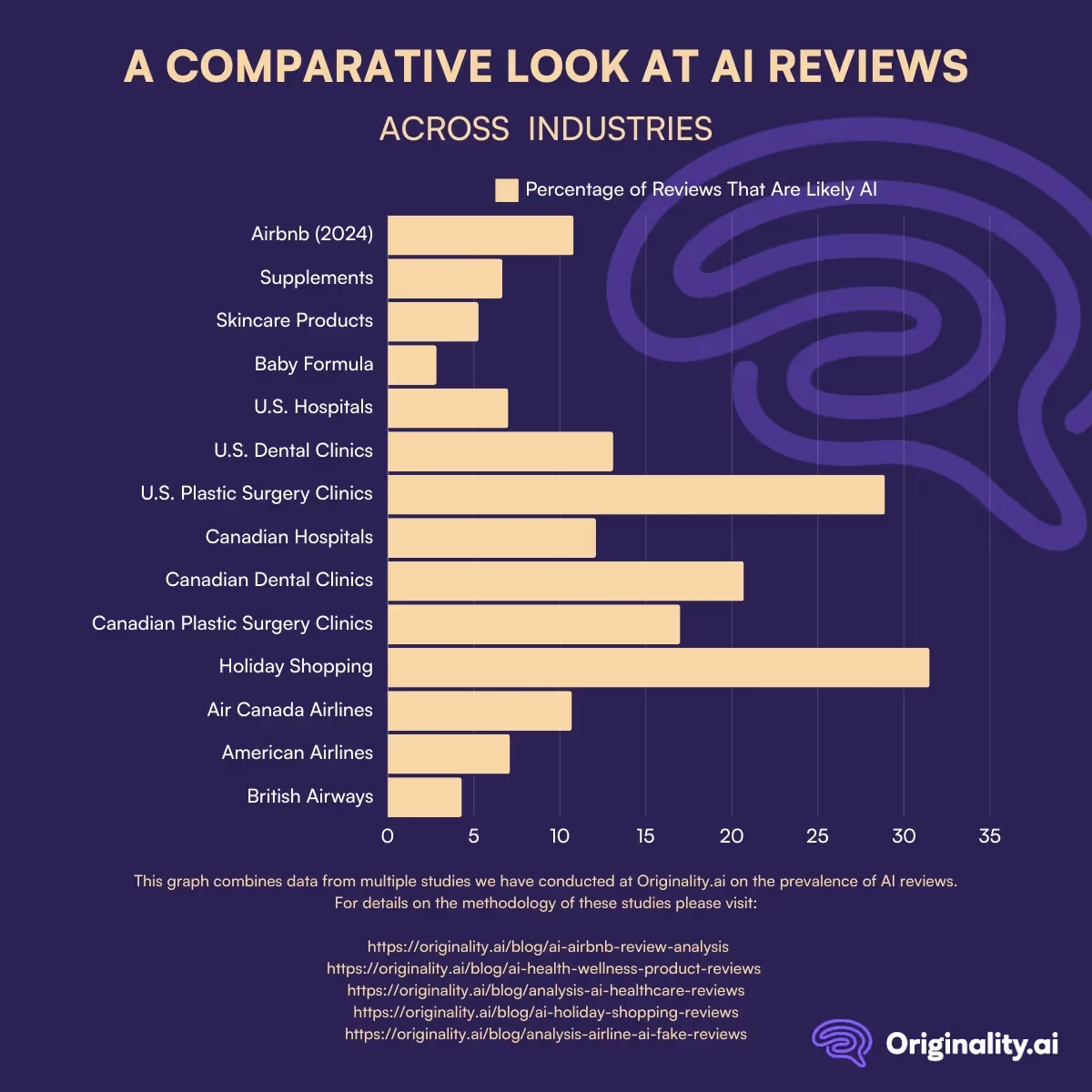
So, in the broader context of the industries we analyzed, such as holiday shopping, airlines, and health care clinics — and now Airbnb, the overall presence of reviews that are Likely AI is rising.
These findings highlight the need for further studies to investigate the motivations behind the creation of AI-generated reviews and their impact on user experiences.
Additionally, it calls for the development of advanced AI detection tools, like Originality.ai’s best-in-class AI detector to maintain the credibility of platforms dependent on user-generated content.
Analyzing AI-Generated Reviews on Airbnb: Methodology
To study the prevalence of AI-generated reviews on Airbnb, we extracted and analyzed data from Trustpilot using Python libraries like BeautifulSoup and requests. Reviews, titles, and posting dates were scraped across pages, saved in CSV files, and filtered for entries with at least 50 words.
AI Detection Process
Using Originality.ai, we evaluated each review's likelihood of being AI-generated, with outputs including an AI likelihood score and a binary classification. A retry mechanism ensured robustness against network errors, and results were saved incrementally for continuity.
Outcome
This scalable approach combined advanced AI detection with robust error handling, enabling a reliable analysis of AI-generated content in online reviews and fostering informed discussions about its impact.

MoltBook may be making waves in the media… but these viral agent posts are highly concerning. Originality.ai’s study with our proprietary fact-checking software found that Moltbook produces 3 X more harmful factual errors than Reddit.